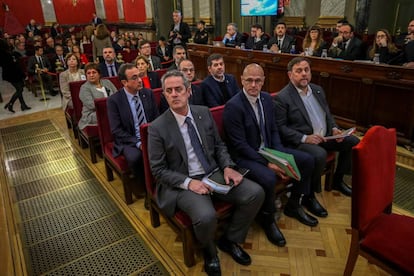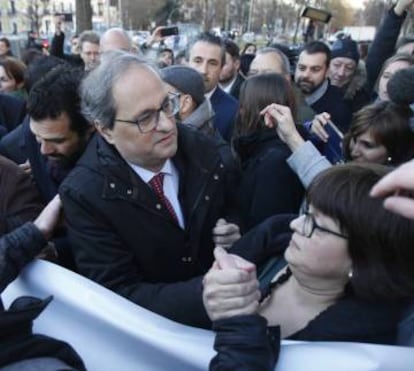Supreme Court trial of Catalan separatist leaders opens in Madrid
Regional premier Quim Torra comes to Spanish capital to show support for 12 defendants facing charges related to the illegal referendum and unilateral declaration of independence

A highly anticipated trial of Catalan separatist leaders began on Tuesday at 10.23am inside the Supreme Court in Madrid, where 12 defendants are facing charges in connection with the unauthorized referendum of October 1, 2017 and the unilateral independence declaration that followed.
I am walking in with my head held high, convinced that self-determination is not a crime Defendant Jordi Sànchez
The legal proceedings are being closely followed in Spain and abroad, where the separatist movement has sought to portray them as a political trial that will invariably result in guilty verdicts. Prime Minister Pedro Sánchez of the Socialist Party (PSOE) recently traveled to Strasbourg in a bid to convey the message that defendants will get a fair trial.
On Tuesday morning, the crowd that had congregated outside the courthouse included Catalan premier Quim Torra and regional parliament speaker Roger Torrent.

“I am walking in with my head held high, convinced that self-determination is not a crime,” tweeted one of the defendants, Jordi Sànchez, the ex-president of a civic association called the Catalan National Assembly (ANC). Sànchez is on trial for his role in the events of September 20 and September 21, when protestors outside the Catalan government’s department of economic affairs vandalized Civil Guard patrol cars and hindered the work of officers searching for material connected to the referendum.
The ANC has asked for workplace stoppages in Catalonia today to protest the trial, and it is calling street marches across the region at 7pm.
The Tuesday hearing is dealing with preliminary issues that include the possibility for lawyers to request putting the proceedings on hold for medical or other reasons. The legal teams may also debate the evidence that will be used at the trial.
Political reaction
Teodoro García Ejea, secretary general of the conservative Popular Party (PP), said that the secession attempt was “a coup against the state.”
“The proceedings that begin today prove that the rule of law works in Spain. Regional premiers and governments are subject to the law, and this trial proves it,” he added.
The chief of the Catalan justice department, Ester Capella, said that the trial “should not be taking place, it is a result of state repression.”
Speaking on the Catalan radio station Rac 1, she said that it is an attempt at "resolving political differences with prison bars rather than ballot boxes."
After the court clerk read out the charges – rebellion, sedition, misuse of public funds, criminal association and disobedience – defense attorneys talked about an alleged violation of the defendants’ rights. This idea is central to the defense, which is already preparing an appeal to the European Court of Human Rights, no matter what the verdict.
Andreu Van den Eynde, the lawyer representing the ex-deputy premier of Catalonia, Oriol Junqueras, said it was “not predictable” that independence leaders would be charged with the crime of rebellion. Prosecutors’ interpretation of this crime has been “new and unpredictable,” and “a majority” of people believe there was no such crime.
“Nobody in Europe understands why the response to these events must be this severe,” he said.
Van den Eynde also made renewed calls for international observers at the trial. The Supreme Court has already rejected this petition, although three members of International Trial Watch walked into the courtroom on Tuesday as members of the public.
English version by Susana Urra.
Tu suscripción se está usando en otro dispositivo
¿Quieres añadir otro usuario a tu suscripción?
Si continúas leyendo en este dispositivo, no se podrá leer en el otro.
FlechaTu suscripción se está usando en otro dispositivo y solo puedes acceder a EL PAÍS desde un dispositivo a la vez.
Si quieres compartir tu cuenta, cambia tu suscripción a la modalidad Premium, así podrás añadir otro usuario. Cada uno accederá con su propia cuenta de email, lo que os permitirá personalizar vuestra experiencia en EL PAÍS.
¿Tienes una suscripción de empresa? Accede aquí para contratar más cuentas.
En el caso de no saber quién está usando tu cuenta, te recomendamos cambiar tu contraseña aquí.
Si decides continuar compartiendo tu cuenta, este mensaje se mostrará en tu dispositivo y en el de la otra persona que está usando tu cuenta de forma indefinida, afectando a tu experiencia de lectura. Puedes consultar aquí los términos y condiciones de la suscripción digital.








































